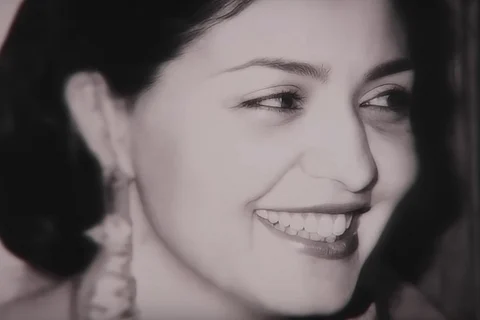

Many among us may be familiar with the ‘Richmond Road case’ in Bengaluru. In the early 1990s, Shakereh Khaleeli, the granddaughter of the Diwan of Mysore, was found dead in the courtyard of her own home. Her skeletal remains were discovered by the Karnataka police in 1994, three years after Shakerah’s daughter raised an alarm that her mother was missing. Shakerah’s remains led to a particularly gruesome revelation—that she was buried alive. The man accused of killing her is currently serving a life sentence. Amazon Prime’s new series, Dancing on The Grave, tries to bring the Richmond Road case back into the limelight.
The series is one of the latest in the ever-growing genre of true crime. It primarily relies on material from the India Today Archives, old interviews, vox pops from the friends and family of Shakerah, and of lawyers involved with the case, juxtaposed with dramatised tellings of court testimonies. Directed by Patrick Graham and produced by India Today Originals, Dancing on the Grave also attempts to look at the social scenario at the time leading up to Shakereh’s death.
Shakereh, a wealthy, aristocratic woman from the Shia community – the wife of a highly placed diplomat and the mother of four girls – divorced her husband and married an influential Hindu godman. She was shunned by her own family for her choice until she was killed. Her second husband, now accused of her murder, was Murali Manohar Mishra who called himself Swami Shradhananda.
The series takes time to first set up this background and tell audiences how Shakereh’s relatives viewed her second marriage (including claims of “black magic”) before the camera arrives at 81, Richmond Road, cut off from the outside world by formidable gates and menacing walls.
We are told the story of Sabbah Khaleeli’s repeated attempts to find out her mother’s whereabouts after she first realised something was amiss. Relying heavily on the testimonies Sabbah gave in court and her interviews with India Today from the time, the show tries to piece back together events from decades ago.
Dancing on the Grave does an appreciable job of engaging viewers who may both be familiar with what happened and those who are hearing of Shakereh for the first time. The high-profile nature of the case and the grotesque elements of her murder—Mishra held parties in the very courtyard under which he’d buried Shakereh–led to the police naming the case ‘Dance on the Graveyard’ in their records, India Today reported at the time. The show takes its name from this record and works towards convincing viewers that Misra was a monstrous outsider and even “beneath Shakereh’s stature” as one relative puts it.
But it also offers a rare perspective—that of Misra himself. Through the lawyer who represented him decades ago, we hear what Misra has to say so many years hence. It’s a clever cinematic move to juxtapose the frail old man he has become against the image of a scheming outsider we’re given until that point, for those hearing of the case for the first time through this series, who may be eager to know what a man serving a life sentence for such a case has to say now.
The four-part series is no doubt intriguing. Each episode pushes you to the next, driven by a sheer curiosity about what else one could glean about a case so high profile, and yet forgotten over the three decades since. But that is also what is discomfiting about it, as is applicable to most true crime shows—the show relies on the element of a voyeur hungry for every detail of this sordid tale.
Dancing on the Grave isn’t alone in this. Unfortunately, the genre occupies a strange zone where there are no clear answers. While all true crime shows may not apply the rigours of good journalism or documentation, we must ponder what distinguishes news coverage and a docu-drama on a terrible tragedy, to an indifferent viewer.
Another aspect that is grating about the series is that it leans far too much into romanticising the aristocratic lifestyle. It is undeniable that Shakereh was a victim, but aristocracies hardly merit the kind of other-worldly charm that the show tries to spin around them. Even the mild view that the series offers—that Shakereh may have rebelled against a life set up for others, is softened to a degree that it sounds like the ‘noblesse oblige’ valourised in Euro-centric shows like Downton Abbey and others of its ilk.
Certainly, it’s possible to have compassion for the victim of a horrific murder and the circumstance leading to her death, without sugar-coating undue general power and wealth inherited by aristocratic families.